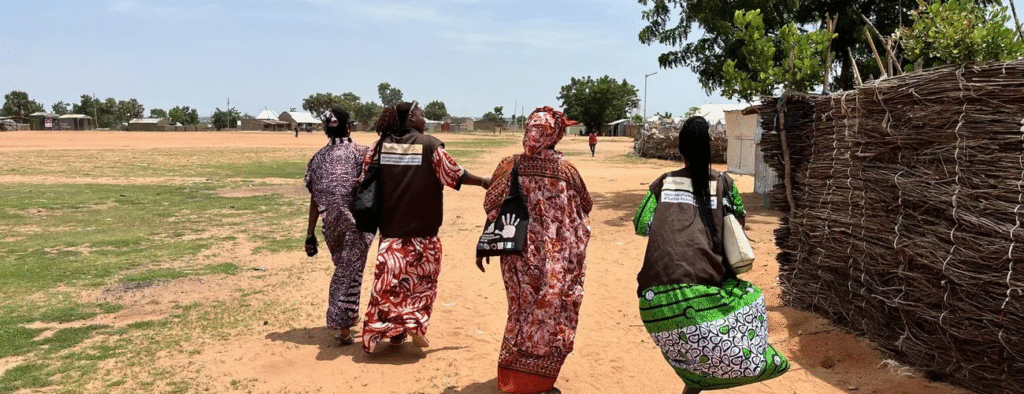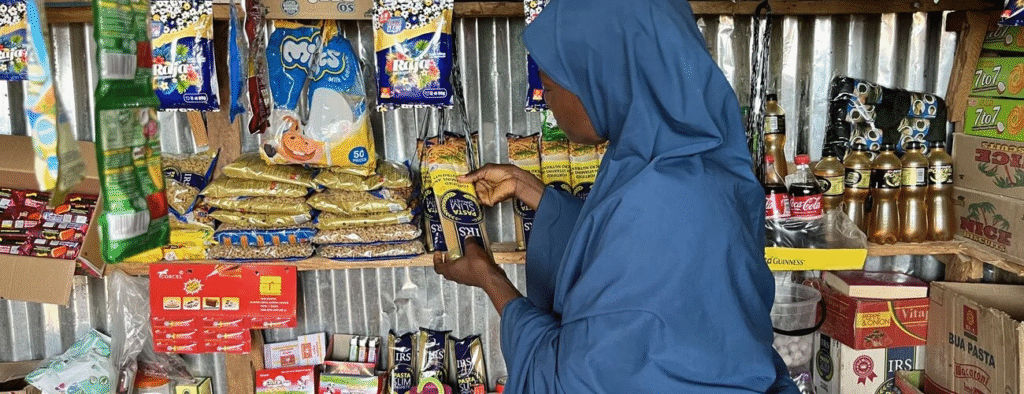Ruqoyah Ogunbiyi is the Psychosocial Support Lead with the Youth Initiative Against Terrorism (YIAT).
There are more than 30 women in the room in Adamawa, northeast Nigeria, where I lead a pyschosocial therapy session as part of GSF’s interim reparative measures project. All are survivors of sexual violence committed by Boko Haram. As they settle in, I invite them to close their eyes and imagine their lives five years from now.
Their responses – building businesses, expanding farms, caring for livestock – are filled with hope.
In response, I introduce the word Maikudi.
In Hausa, Maikudi refers to a “wealthy person” – not just someone who has resources, but someone who is respected, established, and known in the community. It came naturally in the moment. I teased the group by saying, “It sounds like all of you are becoming Maikudi.” They laughed, but something shifted.


Four caseworkers walking to a survivor’s house in Girei. Caseworkers hold an important role in the project as they accompany and support survivors participants throughout the project. Nigeria, June 2025. Sarah-Eve Hammond/GSF

I then ask if they’d be willing to introduce themselves using Maikudi in connection with the livelihood choices they had selected during the project. I give examples of Maikudi Shanu (to refer to cattle rearers), Maikudi Gona (for those interested in farming), and Maikudi Shago (for those engaged in small businesses and enterprise). They decide to do so.
Over the weeks that followed, women in the group began to refer to one another, and themselves, in this way. The name gave them not just a new title, but a new lens through which to see themselves. One that allowed them to see themselves as survivors with capacity and direction, not just recipients of assistance. This is what identity reframing can offer: the possibility of internalising the future you are building.
I am the Psychosocial Support Lead with the Youth Initiative Against Terrorism, working in partnership with GSF in northeast Nigeria. Together with survivors, we have created interventions that are trauma-informed, culturally resonant, and embedded in broader efforts for reparations and justice. Maikudi is one of the simplest but most meaningful shifts we’ve seen in our psychosocial work.


When she defined her interim reparative measures, one participant decided to take up her former trade of textile seller. Her business expanded and she now does wholesale as well. With the money saved she plans on buying a plot of land. Nigeria, June 2025. Sarah-Eve Hammond/GSF

Maikudi isn’t a vision — it changes how survivors carry themselves. We’ve seen women stand taller, speak with more clarity, negotiate differently. This opens the door to quiet yet profound changes in how survivors present themselves in their communities.
For many survivors, psychological and identity reframing is as important as economic support. Affirming, culturally sensitive language has become a quiet but powerful tool in changing perceptions of survivors. This is vital in survivors being welcomed and accepted back into their communities, which often stigmatise those who have been subjected to such violence. But it also gives them a stronger sense of self-belief and pride.
“Ever since I embraced the name Mai kudin Shago (shopowner), my mindset towards my business has completely shifted,” shared a woman from Fufore. Another said, “Calling myself Mai kudin Baranda (grain-seller) fills me with pride and reminds me I’m on a journey worth celebrating.”
“As Mai kudin Gona (farmer), I truly feel I’ve earned the name; it reflects both my hard work and the rewards,” added another survivor.
These names weren’t just symbolic; they helped shape new realities.
Maikudi reminds us that psychosocial support isn’t only about addressing trauma. It is about reframing futures. It is about finding a name that speaks not just to what survivors have endured, but to who they are becoming.